How Climate Change Affects the Cattle Industry?
Climate change is a global concern that impacts both humans and animals. Cattle, in particular, are extremely sensitive to the effects of climate change.
In this blog, we will explain how climate change impacts cattle and how to prevent its effects. Moreover, as compared to the human comfort, animal comfort and well-being are also just as necessary. If the cattle are being taken care of, the milk produced will be in greater quantity.
Did you know that the cow’s normal temperature is 38°C (101°F) and during summer it can go up to 104°F? So, it is necessary to ensure their well-being.
The effects of climate change on the cattle industry include heat stress, decreased feed intake, and weakened immune systems in cattle. Extreme weather events including heatwaves, droughts, and strong storms are brought on by climate change. These elements may cause cow populations to become less productive, more disease-resistant, or even die. Novel Approaches in the Cattle Sector:
Fans & Ventilation
These are essential tools in the fight against heat stress in cattle, which is brought on by rising temperatures. Proper ventilation helps control the temperature and humidity levels in barns or feedlots to provide the cattle with a more comfortable environment. This can raise productivity levels overall, decrease heat-related diseases, and increase feed efficiency.
Scrapers Units:
In cattle holding facilities, scrapers units are crucial for keeping the flooring dry and clean. Scrapers units assist in preventing the growth of dangerous microorganisms and lowering ammonia emissions that may have an adverse effect on air quality by quickly eliminating manure.
In the process, it reduces pollutants to the environment and improves cow health and cleanliness.
Solution Alkaline:
To keep diseases under control and provide a healthy environment for cattle, livestock facilities are cleaned and disinfected using alkaline solutions.
By using these solutions, the operation’s general cleanliness standards are raised and the risk of disease transmission among the animals is decreased.
Through the appropriate application of alkaline solutions, farmers may improve biosecurity protocols and protect their livestock from infectious pathogens.
Conclusion
The cattle business has ongoing challenges due to climate change. To ensure the welfare and production of livestock, it is imperative to implement creative solutions such as fans, ventilation systems, scrapers units, and alkaline treatments.
Farmers can lessen the negative effects of climate change on livestock operations while promoting efficient and sustainable production methods by incorporating these technology into their farming practices.
Accepting these developments helps the cattle business remain resilient and successful in the face of a changing environment, in addition to improving the welfare of the animals.

